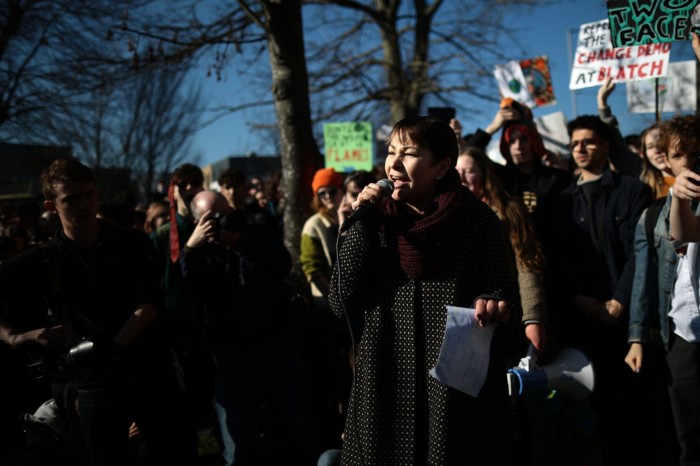How the UK’s electoral system holds back green groups

Simply sign up to the Climate change myFT Digest -- delivered directly to your inbox.
When Just Stop Oil activists made headlines last year for their disruptive tactics — which included pouring soup over Van Gogh’s (glass-protected) “Sunflowers” — people were quick to draw parallels with early 20th century suffragettes, who used similar strategies in their fight for voting rights.
But a prosecutor in a case against other Just Stop Oil activists last December dismissed the comparisons. The suffragettes had “no democratic means by which to further their cause,” he said. “We have an established democracy.”
Many activists in the UK who want to see more action on climate say the Westminster model — in which MPs are elected on a ‘first-past-the-post’ basis — is ill-suited to the task.
Under this system, the candidate who wins the most votes in each geographical constituency is elected. This means the distribution of seats in the House of Commons can differ markedly from the percentages of votes won nationally.
It typically results in smaller parties failing to gain representation at national level and ending up locked out from positions of power. The Green party, for example, has a geographically diffuse support base, so it tends to lose out when its would-be supporters opt for tactical voting and decide to back a more likely local winner.
A spokesperson for Just Stop Oil says: “The politics we have at the moment, in terms of representative democracy, is probably one of the worst forms of government to have amid an existential crisis.”
Representatives of campaign groups, including Just Stop Oil and Extinction Rebellion, say that changes required to tackle the crisis involve shifting to a system of ‘deliberative democracy’ founded on citizens’ assemblies (groups, representative of the electorate, that deliver recommendations to government), as well as efforts to educate the public and combat climate change denial.
In 2011, there was a referendum on switching to the alternative vote system — which allows citizens to rank their choices on the ballot — and it was rejected. But others are in favour of a different system: proportional representation.
Owen Winter, co-founder of non-partisan electoral reform advocacy group Make Votes Matter, which campaigns for the UK to adopt proportional representation, points to research by the University of Michigan into the breadth of debate on policy under proportional voting systems:
“When there are more political parties represented, there’s broader political debate [and] climate issues tend to rise up the agenda,” he explains. “This feeds through into public opinion and ultimately into policy outcomes.”
Winter also suggests that governments elected by proportional representation tend to take a longer term view of policy, which is important for climate initiatives.
Calls for electoral reform appear to be becoming more mainstream in the UK. At the Labour party’s conference in Liverpool, last September, delegates backed a motion calling for the endorsement of proportional representation. Party activists are pushing for its inclusion in Labour’s next manifesto.
Clive Lewis, Labour MP for Norwich South, on the leftwing of the party, is a vocal advocate of the proportional system. “The climate crisis isn’t just a market failure, it’s a failure of democracy,” he argues.
For Lewis, first-past-the-post is the cause of a “political bottleneck” where a focus on swing seats and their constituents has reduced the scope of political debate, and given certain interest groups and the media a disproportionate influence on the political agenda and election outcomes.

Other parties, including the Greens and Lib Dems, have long been united behind proportional representation. Caroline Lucas, former Green party leader and the party’s sole MP, says the system in its current form is “a gigantic roadblock holding up progress”.
“Unfortunately, we’re simply not tackling the climate emergency at anywhere near sufficient speed under our current electoral system — and that’s why the system has to change,” she says.
In the 2019 general election, the Green party received 865,000 votes nationally but won just a single seat, Brighton Pavilion, where Lucas was the incumbent. In the same election, the Conservatives took 365 seats, averaging 38,000 votes for each MP elected. Labour took 202 seats averaging 50,000 votes per MP elected.
To Lucas, the Conservative government’s approval of Britain’s first coal mine in decades, as well as a new licensing round for North Sea oil and gas exploration, are evidence of its lack of commitment to tackling the climate crisis.
But the Greens do not have to look far for inspiration on how to perform better electorally under a different electoral system. In elections to the UK’s devolved administrations, the mechanisms are all more proportional than first-past-the-post.
“Greens are in parliaments, and indeed governments, across Europe, wherever there are fairer voting systems,” says Lucas, noting that in Scotland the Greens are in power as junior coalition partners.
Similarly, in the Republic of Ireland, the Greens have been in government as a coalition partner since 2020. The party points to the 2021 Climate Action Plan as evidence of its impact on the country’s climate goals: the legislation legally bound the Irish government to halve greenhouse gas emissions by 2030 and to reach net zero by 2050 — although, since its implementation, the plan’s feasibility has come under scrutiny.
Proportional representation also has its advocates on the opposite end of the political spectrum. The Brexit party failed to secure any seats in the 2019 general election despite receiving more than 640,000 votes. Reform UK, the party’s most recent iteration, views proportional representation as essential in allowing “more choice, new ideas, and better debate”.
There is less common ground to be found in the party’s energy policies, though. Reform UK has promised the unlocking of the country’s “shale gas treasure”, the acceleration of oil and gas exploration in the North Sea, and an end to expensive subsidies for “unreliable” renewables.
For Lewis, the risk of proportional representation giving more “extreme” viewpoints a platform in Westminster is not a valid concern. “This idea that you keep extremism out of politics with first-past-the-post is frankly ridiculous when looking at the government we have now,” he says.
Climate Capital

Where climate change meets business, markets and politics. Explore the FT’s coverage here.
Are you curious about the FT’s environmental sustainability commitments? Find out more about our science-based targets here

Comments